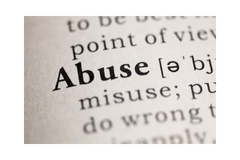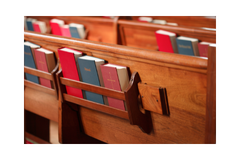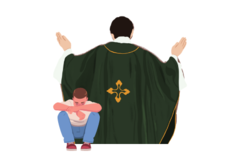An interview not only about the Centre for Child Protection (CCP), but also about the case of Marko Rupnik and the work with victims and perpetrators of sexual violence in the church.
Is Hans Zollner still working at the Centre for Child Protection? A question we have heard recently in the Czech Republic from a few people. So we asked directly.
You are the head of the new institute IADC, can you describe the history of education in the field of safeguarding minors at Gregorian University?
The origin of the Institute of Anthropology. Interdisciplinary Studies on Human Dignity and Care (IADC) is the Centre for Child Protection (CCP), which was established in 2012 in the wake of the waves of public interest in sexual abuse scandals the Catholic Church. Founded jointly by the Pontifical Gregorian University, the Archdiocese of Munich and Freising and the Department of Child and Adolescent Psychiatry and Psychotherapy of the State University Clinic of Ulm, the CCP moved to Rome, the centre of the Catholic Church, in October 2014. On 1st September 2021, following the approval of the then Congregation for Catholic Education, the CCP became the Institute of Anthropology. Interdisciplinary Studies on Human Dignity and Care (IADC) at the Pontifical Gregorian University.
The IADC is committed to teach and research the issues of dignity and care in an intercultural and interdisciplinary way, basing its approach on an anthropological view of human life from a Christian perspective. In this way, the IADC intends to contribute to the formation of men and women who serve others, especially those whose dignity has been wounded and those whose dignity needs special care.
What are you most proud of in this educational project?
I don’t think “proud” is the right word, but we have certainly a sense of deep gratitude for what has been achieved so far in the last 12 years with committed work, devoted human resources and the lead the of the Holy Spirit, which has guided our steps, even in difficult times.
Since the beginning, we have offered a blended learning program in collaboration with partner institutions worldwide. We have created residential academic programs, as well, in the forms of a one-semester Diploma in Safeguarding in English since 2016 and in Spanish since 2021, a Licentiate in Safeguarding (Master – Second Cycle academic degree) in English since 2018 and a Doctorate in Anthropology since September 2022.
We are building a global network of skilled and committed personnel, safeguarders for the Church. Our work is part of a wider movement for change that goes beyond simply acknowledging what has happened, but taking concrete steps for preventing abuse, intervene in situations of abuse, and promote conversation about how the Church, bishops, laity, all of us, can address this urgent issue. An example of collaboration in the field is the International Safeguarding Conference, an annual event promoting the exchange of good practices and mutual learning among practitioners. Another example is the Global Safeguarding Alliance, a group of committed institutions working together in the academic and research fields.
When did you personally first encounter a victim of sexual abuse by a clergy member? What was it like and what was challenging for you?
The first time I worked in the accompaniment of victims of sexual abuse was more than 25 years ago. Each person has a different story of deep suffering. Therefore, in-depth listening, not only with our ears, but also with our hearts, with empathy and sincere attention, is needed.
Encounters and meetings with victims and survivors are vital to what we do at the IADC, and our work is informed by the voice of victims and survivors. We have been impressed by the courage and determination of those who have been harmed by clerics and other church personnel, and we have become increasingly aware of our need to learn more and to better understand our contribution, also with regard to the spiritual dimension of abuse, through dialogue and discussion. In particular, through the Spes et Salus Foundation we are trying to explore how to create a space for learning and exchanging ideas and we pledge to be an active part, as well as an honest partner, in this learning process.
Do you also have personal experience with abusers? Was it someone close to you? Did you work with them? What was challenging for you in your contact with them?
In my home province in Germany I know one convicted perpetrator personally, and I have met in some occasions briefly with a few more, but I myself have never worked in therapy or any pastoral work with any perpetrator. During these years, I have met very good professionals who have been working with abusers, both in the clinical and the legal and canoncial fields. I have also had the chance to visit specific treatment centres in the USA and in Canada in which abusers have received treatment.
In the case of abusers, the first thing is to comply with the civil and canonical penalties imposed on them. In addition, in the ecclesial context, it must be ensured that these persons do not carry out any task that involves working with children or vulnerable people. And secondly, to promote prevention and avoid new abuses, three steps must be taken. Firstly, the abuser must undergo appropriate and supervised therapy. Consequently, attention should be paid to the living conditions in his or her own environment, as this may influence his or her behaviour. Thirdly, a "safety plan" has to be established and the person has to commit to follow clear guidelines, which will be more or less strict depending on the case.
Would you comment on the case of your confrere M. Rupnik?
This is a serious case and I hope that despite all the pain and suffering that this implies for everyone who suffered the abuses, this can be a step forward towards justice and transparency.
As I have mentioned in a recent interview, for the sake of transparency, we need to know who knew something, what and when, and what happened after that. We could have found out about the different levels of responsibility, which could have prevented all of this.
At the level of the Dicastary for the Doctrine of the Faith, I understand that legally speaking, the statute of limitations applies, but the legal question is not the only and this is why I ask why the statute was not lifted.
At the level of my community, I ask myself and ask the Jesuits: Who could have known? Who did know? Who perceived something was wrong and did not go further?
There is a lot of emphasis in our country that it is good not to give any money to victims, because fake victims would start reporting. What do you think about that?
Many victims have lost a lot of possibilities in their lives: education, family, health, and quite often their trust and faith in God. Financial recognition for suffering and injustice as a result of abuse comes before the protection of financial assets or other resources of the church institution. The Church in Austria, since almost 13 years, has a very successful model in place how to determine the veracity of allegations. What the independent Klasnic-Kommission proposes to the Bishops conference and the Religious Congregations is consequently paid out within a certain range. From my experience, not all victims are expecting money – sometimes they even refuse it because it is “blood money” for them –, and even if we offer a fair compensation, justice will never be complete, as many victims have shared with me.
I cannot speak in the name of the victims, but most of the victims I've spoken to stress that they want to be heard, which is something that can be easily said, but not so easily done. This means that they need a person listening that must be open, both in mind and in heart, to empathize and understand the deep suffering that person is sharing with them. Many survivors say they would like someone in the Church to listen to them—a bishop, if the abuse occurred in a diocese, or a provincial, if the abuse occurred in a religious congregation. In the end, everything leads to the most important point in a healing process: being heard. For victims it is also important to see clear and coherent signs of change in the Church law and in the attitudes and behaviour of its representatives.
How do you explain the resistance to actively addressing abuse in countries where scandals have not yet broken out? Have you come across an example of good practice anywhere where, before a scandal broke out, the church itself had intensively raised the issue of abuse within its ranks?
The resistance to actively addressing abuse in many countries is a big scandal. There are victims who have faced negligence and resistance from the side of the Church, which has provoked in them profound wounds, also at the spiritual level. There is still a lack of understanding that caring for victims and committing to prevention is an integral part of the Church's mission. It is not something that can simply be ticked off a list of things to do.
Most bishops' conferences have started to implement the basic agreements of the Vatican 2019 summit. There are countries where they still deny or cover up abuses or where anything was done, such as in countries with serious humanitarian crises or in war situations. Then there are countries where many resources have already been invested in promoting safeguarding.
At the IADC, we are seeking to understand through research where the resistance lies within the system. We conduct research on this, with experts from outside the Church, and we offer our academic programmes to those who will be put in positions of responsibility in dioceses, Orders and Congregations and Catholic institutions to look after the implementation of safeguarding measures. We also try to strengthen our network of partners and alumni who promote change from the local level. What we would like to see is that we, as a church, live according to the Gospel and message of Jesus to care for the wounded ones, the vulnerable ones, and not care so much about the image of the church, its prestige or public perception.
Where will the issue of child sexual abuse go from here? Nuns, adult women, and men or somewhere further afield? How will this change the church?
In recent years we have seen how the general awareness on the issue of abuse in the society in general, and also within the Church, has changed. If we think of the #MeToo movement or the abuse of seminarians or religious women, we have become more aware that beyond child abuse, we need to include the discussion of the abuse of vulnerable persons. And this has certainly an impact at all levels, from the policy guidelines to the formation plans and the prevention measures.
In this line, the IADC continues to pay close attention to the protection of children, but has open its scope of research to other types of abuse that exist within the church to consider issues like child dignity online, abuse of power and spiritual abuse, and the abuse of vulnerable persons. I believe it will ultimately change the Church and will help “her” – i.e. all of us who are members of the Church – to return to a deeper understanding of where Jesus Christ is in this world, what the Church’s primary mission is, and what it means to try to follow the Gospel’s message more fully, within our human limitations.
Someone Will Believe You (Někdo Ti uvěří) is an association of victims and professionals who care about the issue of abuse (not only) in the church. We offer a safe environment for victims to share what has happened to them, we educate. We care about the church and the people in and around it. We have hope that the alienation caused by abuse can be overcome.
You can contact us at napiste@nekdotiuveri.cz





